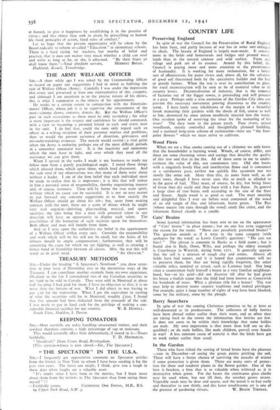THE ARMY WELFARE OFFICER
Sia,—A short while ago I was asked by my Commanding Officer to record on paper any suggestions I had in mind as befitting the task of Welfare Officer (Army). Candidly I was under the impression that every unit possessed at least one representative of this category, and although I am uncertain as to the precise nature of his duties, this is what I summarise as the objects of his appointment.
He works to a certain extent in conjunction with the Entertain- ments' Officer, whose job it is to supervise the amusements of the men—cinema shows, concerts, dances, &c. Rut the Welfare Officer's part in such recreations as these must be only secondary ; for what is more important is the respect and confidence he should command, with a view to becoming a personal friend to each and every man in the unit. I do feel that, could the men only regard such an officer as a willing recipient of their personal worries and problems, then so would the present existence of desertion, grievances and misunderstandings evanesce. The morale would ascend ; a vital point when the Army is enduring perhaps one of the most difficult periods in a somewhat unnatural war. It is the inactivity and monotony which the men have to fight, and over which they need all the assistance we can give them.
When I served in the ranks I made it my business to study my fellow men from a purely psychological angle. I noted those things which pleased them, which upset them, which bred discontent. And the sum total of my observations was that many of them were sheep without a leader. I am of the firm belief that each individual must be made to realise that he is important ; it is this that will imbue in him a personal sense of responsibility, thereby engendering interest and, of course, keenness. Then will be borne the true team spirit, without which no cause can be successful. It is not an easy matter to put forward any concrete suggestions as to how exactly the Welfare Officer should go about his job ; but, apart from making contacts with the men, there are a score of things which he might very well organise—debating, play-reading, musical, and sports societies; the idea being that a man with potential talent in any direction will have an opportunity to display such talent. The possibilities of the formation of such societies speak for themselves. Both officer and man will benefit from them.
And so I urge upon the authorities my belief in the appointment of a Welfare Officer within every unit. Certainly the responsibility and work which will be his will not be small, but the fruits of his labours should be ample compensation ; furthermore, they will be cementing the cause for which we are fighting, as well as creating a firmer bond of friendship between all classes. After the war this will


























 Previous page
Previous page